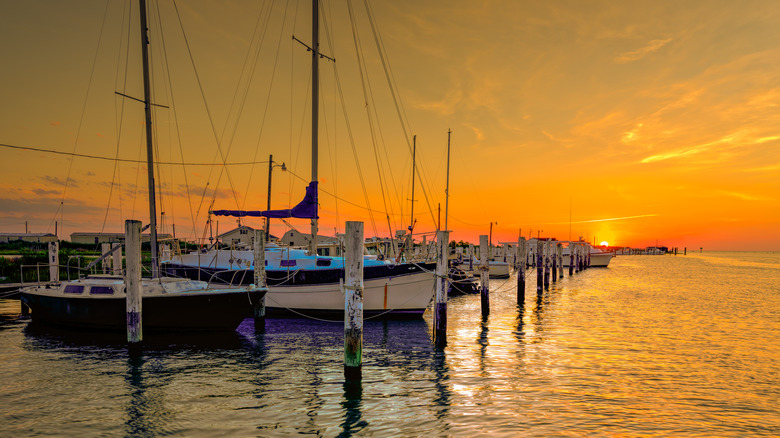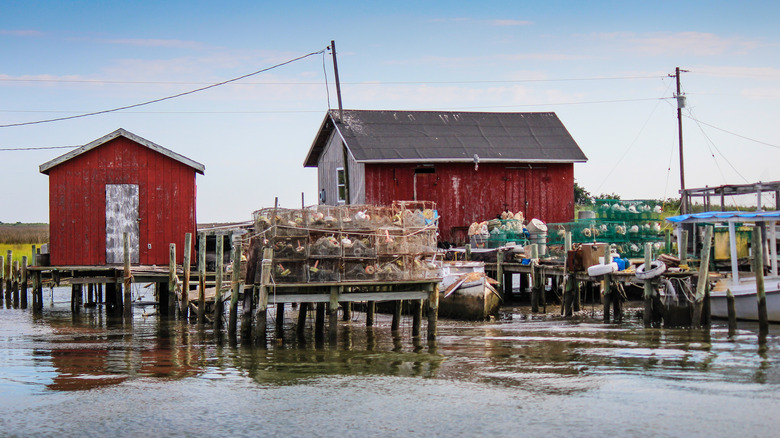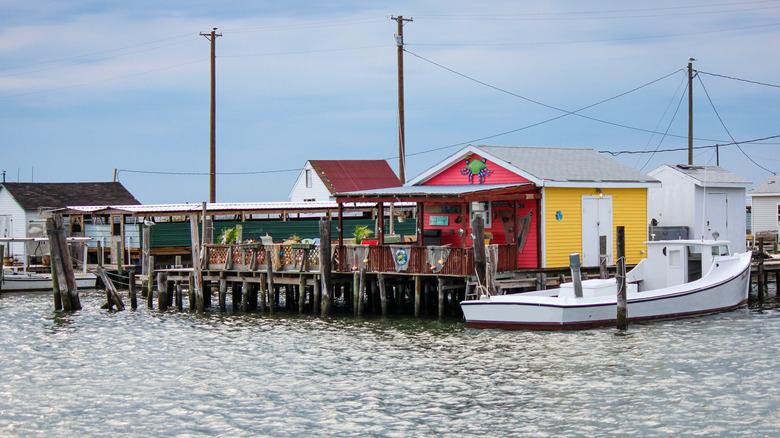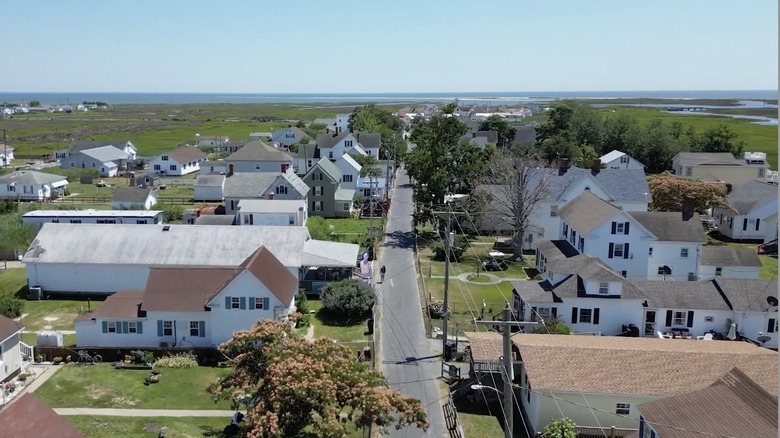America's Soft-Shell Crab Capital Is A One-Of-A-Kind Virginia Island That's Slowly Disappearing
Kevin Costner's 1995 movie "Waterworld" depicted a futuristic Earth covered almost entirely by water. It may have seemed far-fetched at the time — or at the very least something that couldn't possibly happen in our lifetimes — but there's an island 12 miles off the coast of Virginia that is so rapidly losing ground to the ocean that it may be completely engulfed by water as soon as 2075. It's not just an uninhabited atoll like Crab Island near Destin, Florida. We're talking about Tangier — a rustic island fishing community known as America's soft-shell crab capital.
Currently measuring 1.2 square miles — slightly smaller than New York City's 1.3-square-mile Central Park — Tangier has lost 67% of its landmass since 1850, according to a 2015 study published in Scientific Reports. In the early 1800s, a reported 1,500 residents lived on Tangier Island. That number fell to 876 by the year 1960. In 2024, the island has about 430 residents.
Archaeological evidence suggests indigenous people frequented the Chesapeake Bay island's rich fishing grounds long before European settlers caught sight of it in the early 1600s. By the mid-1700s, Tangier was home to a thriving community of river workers who harvested fish, crabs, and oysters from the surrounding waters. It's difficult to trace what prompted someone to eat a soft-shell crab in the first place — even the biggest fans acknowledge their appearance can be off-putting — but we do know the unlikely food source was a hit, and the water workers of Tangier are masters of the haul.
Tangier Island: Leading producers of soft-shell crabs
For the uninitiated, soft-shell crabs are blue crabs caught right after they molt or shed their shell. Just like lobsters and snakes, crabs discard their hard shells as they grow. The catch (pun intended) is it's only a matter of hours, not days, before the crabs' new shells begin to harden up enough to pass the point of soft shells. Through generations, Tangier's water workers perfected the practice, and the infrastructure of their ingenious method is part of what gives Tangier Island its unique appeal.
Instead of leaving their success to the luck of the haul, workers trawl for blue crabs, then inspect their catch in search of peelers (the name for hard-shell crabs that appear ready to molt). The peelers are then released into tanks stored on floating crab shanties where they are harvested as soon as they fully molt. Given their location lining the entrance to the island's main harbor, the shanties are one of the first things visitors see as they arrive at Tangier Island.
But even as leading producers of soft-shell crabs, Tangier's waterworkers face an uncertain future, and the biggest threat to their livelihoods is the very thing that has sustained island families for generations: The ocean. A stone's throw from the channel where current-day watermen go about their business, once-thriving communities in a part of the island known as the Uppards have been completely reclaimed by rising waters, which is not surprising given the highest elevation on the island now stands at just four feet above sea level.
Holding on to tradition
Despite the diminishing landmass, Tangier Island residents steadfastly cling to tradition — and hope that state and federal programs may stem the encroaching tide. In the meantime, they carry on with everyday life on an island that seems almost stuck in time. And that's the way they like it. There's one general store. It's stocked by shipments of groceries that arrive twice a week. Bikes and golf carts are the primary means of getting around. There are four restaurants including three seasonal venues. Lorraine's, established in 1984, is the only year-round eatery. None of the venues serve alcohol, and BYOB is frowned upon in restaurants and on the island in general.
What's more, the residents speak in what sounds to some like Old English. "Here you have these communities that people came to early, but they have just been isolated," David Shores, Tangier-born author and linguist, told National Geographic. "They have retained features that have passed out of Virginia speech."
Tangier Island Airport (KTGI) is more of a landing strip suitable for private pilots than a full-service airport, but the island is easily accessible via a one-hour ferry ride from Onancock, Virginia. Operated by longtime Tangier Island resident Mark Crockett, the Tangier-Onancock Ferry offers regular seasonal service on board "Joyce Marie II." The Coast Guard-certified 36-foot-long fiberglass lobster boat accommodates 25 passengers running twice-daily departures from Onancock with twice-daily returns from Tangier. Travelers planning an overnight stay can book into the Brigadune Inn or research rental properties. As much as the locals want to hang on to tradition, two of the island's B&Bs have permanently closed in recent years.
Islanders face an uncertain future
Tangier Island is a community in flux. By and large, residents don't want to leave, but with Chesapeake Bay waters rising at a clip that may swallow the remaining landmass in the not-too-distant future, they may have no choice. It's a sad state of affairs for lifelong residents like Cameron Evans. In 2018, then-17-year-old Evans stood with a BBC reporter looking toward the Uppards and sharing the story of the communities that once thrived on a piece of the land the ocean since reclaimed. The moment was especially poignant for Evans. At the time, he was preparing to leave for college.
Even then, his plan was to return permanently to Tangier after graduation, but he was fully aware of the island's uncertain future. "This could be us one day if we don't get our help," Evans told BBC as he looked at the expanse of water where communities once stood. Six years later, Evans, a graduate of Virginia Wesleyan University, is back on the island running successful businesses and serving as Tangier's vice mayor while also nurturing a burgeoning career as a professional photographer. What does the future hold for Tangier Island? Only time will tell, but longtime islanders aren't ready to throw in the towel just yet.



